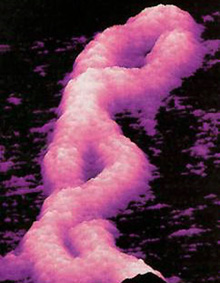We most often think of the stimulus/response theory in connection with Pavlov's experiments with dogs. The basic idea is that we are conditioned to respond in a particular way to a particular stimulus. We are slaves to our environment. Whatever happens to us determines what we do.
Victor Frankl was a determinist raised in the tradition of Freudian psychology, which postulates that whatever happens to you as a child shapes your character and personality and basically governs your whole life. The limits and parameters of your life are set, and, basically, you can't do much about it.
Frankl was also a psychiatrist and a Jew. He was imprisoned in the death camps of Nazi Germany, where he experienced things that were so repugnant to our sense of decency that we shudder to even repeat them. His parents, his brother, and his wife died in the camps or were sent to the gas ovens. Except for his sister, his entire family perished. Frankl himself suffered torture and innumerable indignities, never knowing from one moment to the next if his path would lead to the ovens or if he would be among the "saved" who would remove the bodies or shovel out the ashes of those so fated.
One day, naked and alone in a small room, he began to become aware of what he later called "the last of the human freedoms" – the freedom his Nazi captors could not take away. They could control his entire environment, they could do what they wanted to his body, but Victor Frankl himself was a self-aware being who cold look as an observer at his very involvement. His basic identity was intact. He could decide within himself how all of this was going to affect him. Between what happened to him, or the stimulus, and his response to it, was his freedom or power to choose that response.
In the midst of his experiences, Frankl would project himself into different circumstances, such as lecturing to his students after his release from the death camps. He would describe himself in the classroom, in his mind's eye, and give his students the lessons he was learning during his very torture.
Through a series of such disciplines—mental, emotional, and moral, principally using memory and imagination—he exercised his small, embryonic freedom until it grew larger and larger, until he had more freedom than his Nazi captors. They had more
liberty, more options to choose from in their environment; but he had more
freedom, more internal power to exercise his options. He became an inspiration to those around him, even to some of the guards. He helped others find meaning in their suffering and dignity in their prison existence.
The Talmud teaches us that, "a prisoner cannot free himself from his prison." No one rises up out of the pit by tugging at his own hairs. He needs someone else to pull him out. How does one gain the freedom to choose their response? The redemption from Egypt gave us the ability to do so. It is in that sense that the sages say, "not only has the Holy One freed our ancestors, He also freed us with them." How so? By making us aware of an entirely different aspect of our choices and actions. The moral dimension. Something may be enjoyable to do, but not right. Before we would have done it without question. We would have been enslaved by our stimulus response. Now we can think about what we are doing. Is it right? If not, I can choose not to do it. That is the only
true freedom.
The sages say that "no one is free except one who studies Torah." Seemingly, the opposite is true. The Torah contains rules which restrict our lives. Don't kill. Don't steal. How does that make one free? Because these moral principles enjoin us to rise above our automatic responses. The choice is now on a level that is entirely in our control. Will we do what is right or what is wrong? That is the one thing that is entirely up to us.
Like happiness, self-actualizing is an effect, the effect of meaning fulfillment. ...If he sets out to actualize himself rather than fulfill a meaning (out there in the world), self-actualization immediately loses its justification.
-Victor Frankl, The Will to Meaning, p.38
It is this message of freedom that the Haggada is meant to teach us. "Not only has the Holy One freed our ancestors, He also freed us with them." It is this vital message that must be passed on to the next generation through the expert interactive teaching technique of the Seder. This is the special gift we Jews have inherited and must pass on. Freedom.
The story of Victor Frankl is quoted from The Seven Habits of Highly Effective People by Stephen Covey.

